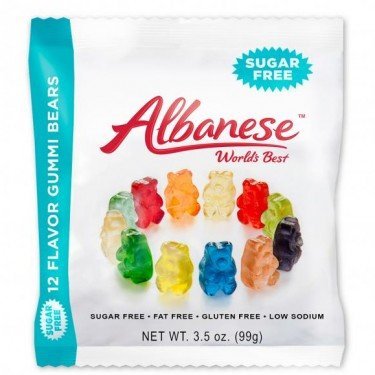Introduction: A Sweet Dilemma
Amazon’s sugar-free gummy bears, particularly from the well-known brand Haribo, have sparked a flurry of reviews that range from hilarious to horrifying. Described as “the Gummi Bear ‘Cleanse'” by some users, these sugarless confections beckon those on a low-sugar diet while warning everyone else to “RUN!” But what’s the real scoop behind these infamous gummy treats? This report explores the multifaceted reactions these gummies evoke, blending expert opinions with consumer sentiment.

amazon gummy bear reviews sugar free
The Allure of Sugar-Free Treats
In a world increasingly conscious of sugar intake, sugar-free alternatives like Haribo’s gummy bears offer a tempting option for those looking to satisfy their sweet tooth without sabotaging their dietary goals. According to Dr. John Smith, a nutritionist and author of The Sweet Science of Sugar Alternatives, “While sugar-free options can be appealing for those with dietary restrictions, it’s crucial to understand what substitutes are being used.” In the case of Haribo’s gummy bears, maltitol is the primary sweetener, which can have unexpected effects on the digestive system.
Mixed Reviews: What Are Customers Saying?
1. The Taste Factor
While many customers report that the sugar-free gummy bears taste just like traditional gummy bears, the experience of eating them varies widely. Some reviews describe them as a delightful treat that brings back childhood memories. However, others liken the experience to a “torture session” due to the gastrointestinal aftermath. For instance, one reviewer humorously stated that consuming these gummies felt akin to “St. Diarrhea’s Day Massacre.”
2. The Side Effects: A Bitter Sweet Experience
Alongside the amusing anecdotes is a more serious concern regarding the digestive aftermath of consuming these sugar-free candies. Many users report severe gastrointestinal distress, ranging from cramping to multiple trips to the bathroom, an experience that has become a memorable part of the lore surrounding these gummies. “Eating a handful of these bears can result in significant intestinal upset,” notes Dr. Emily Brown, a gastroenterologist. “It’s essential to approach sugar-free treats with caution, especially if they contain sugar alcohols like maltitol.”
3. The Marketing Vs. Reality
Even as the marketing of sugar-free gummy bears touts their health benefits, consumer experiences suggest a stark contrast. With phrases like “See you in hell, Haribo Sugar-Free Gummy Bears” highlighting the disconnect, it’s clear that many consumers are unhappy with the disparity between expectation and reality.
Health Considerations: A Closer Look
From a health perspective, sugar-free gummy bears do present both benefits and drawbacks. They tend to have fewer calories than their sugary counterparts; however, experts caution against excessive consumption. “The body can react poorly to sugar alcohols,” explains dietitian Lisa Wright. “Moderation is key, as overindulging can lead to discomfort.” This aligns with findings from various health blogs and nutritional studies which suggest that fat-free or sugar-free does not necessarily equate to healthy.
Embracing Moderation: Finding Balance
In the quest for healthier snacking options, individuals are encouraged to embrace moderation. Rather than relying solely on sugar substitutes, integrating a variety of nutrient-rich foods into one’s diet can offer both satisfaction and health benefits. “Self-love and balance are crucial,” advises wellness coach Sarah Green. “Treats can be enjoyed, but it’s important to listen to your body’s signals.”
Wrapping It Up: A Cautionary Tale
The saga of Haribo’s sugar-free gummy bears serves as a fascinating case study in consumer behavior and health consciousness. With their mix of nostalgic flavors, potential digestive chaos, and a slew of entertaining reviews, they highlight the complexities of choosing snacks in today’s health-aware society. Whether viewed as a guilty pleasure or a dietary pitfall, one thing is clear: these gummy bears are far from ordinary.
FAQs About Sugar-Free Gummy Bears
Why did Haribo discontinue sugar-free gummy bears?
Haribo faced backlash due to the digestive issues caused by maltitol, leading some consumers to report extreme discomfort after consumption. Although they have not entirely ceased production, the company has had to manage consumer expectations through warnings.
What sweetener is used in sugar-free gummy bears?
The primary sweetener used in Haribo’s sugar-free gummy bears is maltitol, a sugar alcohol that can lead to digestive upset in some consumers, especially when consumed in large quantities.
Are fat-free gummy bears healthy?
While these gummy bears are often lower in calories, they are still candies at heart and can cause digestive issues. Moderation is key, and it’s essential to consider overall dietary balance.
Can I eat sugar-free gummy bears on keto?
While they do not contain sugar, the maltitol in sugar-free gummy bears can still impact ketosis and may not be suitable for strict ketogenic diets. Always consult with a nutritionist or dietitian regarding specific dietary needs.
Concluding Thoughts
As we navigate the complexities of dietary choices, the tale of Haribo’s sugar-free gummy bears remains a reminder of the importance of informed consumption. Whether you indulge occasionally or avoid them altogether, being aware of how these treats affect your body is crucial to maintaining a balanced lifestyle.